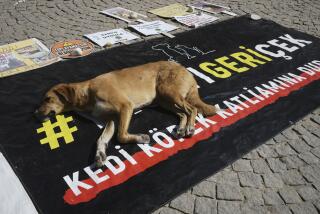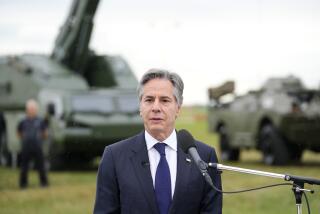Turkey Grants Allies Airspace Rights
- Share via
ANKARA, Turkey — After months of national debate, a sharply divided parliament authorized the government Thursday to open Turkey’s airspace for allied military strikes on Iraq, giving this NATO member country a minimal role in the effort to oust Saddam Hussein.
The decision was expected to yield considerable benefit for the allied bombing campaign that began hours earlier. A senior military official in Washington said the overflight rights would make it easier for U.S. warplanes to reach Iraq undetected and attack the northern part of the country, preventing Hussein from concentrating all his military might to deter forces advancing from the south and west.
Turkish television reported today, however, that the decision had not yet taken effect. In negotiations during the night, the Turkish government was insisting on case-by-case approval of each U.S. flight, the report said, while the Americans sought a more flexible arrangement.
Parliament’s vote also approved a government plan to send two Turkish army brigades to Kurdish-controlled northern Iraq to protect Turkey’s interests there. In doing so, lawmakers ignored warnings by the Bush administration that such an incursion could lead to clashes between Turkish and Kurdish forces.
Parliament’s action did little to heal a rift with Washington. State Department spokesman Richard Boucher welcomed the vote granting airspace rights, but he said the United States remained “opposed to unilateral action by Turkey or by any party in northern Iraq.”
U.S. officials had expected far more help from Turkey and heard that it was coming.
However, on March 1, parliament refused by three votes to permit the movement of 62,000 American ground troops through the nation to Iraq.
Since then, a new prime minister had resisted U.S. pressure to ask lawmakers to reconsider.
With war imminent, the Bush administration scaled back its request and withdrew a multibillion-dollar aid offer that was tied to a U.S. troop deployment.
But even the more modest proposal for overflights angered many in Turkey, where opposition to a war is strong. Others faulted the government for failing to secure the aid package.
As lawmakers met Thursday, hundreds of demonstrators chanting, “America, get out of the Middle East!” placed black wreaths outside the U.S. Embassy in Ankara, the capital, and threw stones and eggs at police, who dispersed them with clubs.
Antiwar activists also rallied in Istanbul.
The vote in parliament was 332 to 202 with one abstention. More than 30 lawmakers of the ruling Justice and Development Party broke ranks with the government to vote no.
Prime Minister Recep Tayyip Erdogan, who tried to balance antiwar sentiment in this country, where most people are Muslim, with the needs of its strongest ally, suggested that the outcome amounted to a fair compromise.
“May it be good for our country and our people,” he said.
Emin Sirin, a lawmaker who opposed the U.S. troop deployment, voted Thursday in favor of airspace rights.
“It’s not easy to reject billions of dollars, but we needed to prove that this was not about money but about principles,” said Sirin. “It was not in our interest to have so many American troops here. When the Americans come, they do not always leave.”
Airspace rights, he added, are “the minimum help we can give to an ally.”
The delays in allowing ground access have in effect made it impossible “to have a credible ground campaign” in northern Iraq at the beginning of operations, the U.S. official said.
The United States is still pressing for approval to send ground troops through Turkey, but it’s too late to use them in the first attacks. Defense officials said the troops could still move into northern Iraq later.
For the time being, the official said, about 40 cargo ships carrying supplies and heavy armor for the Army’s 4th Infantry Division, which the Pentagon had been planning to launch into northern Iraq from Turkish bases, will remain off the coast of Turkey.
Negotiations are likely to continue, another senior U.S. defense official said.
“We try to get the whole dinner. Looks like we’ll have to go a la carte,” the official said. “Maybe we’ll just end up with soup.”
*
Times staff writers Esther Schrader and John Hendren in Washington and special correspondent Amberin Zaman in Ankara contributed to this report.
More to Read
Sign up for Essential California
The most important California stories and recommendations in your inbox every morning.
You may occasionally receive promotional content from the Los Angeles Times.













